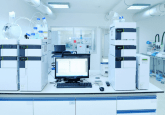Quantification of serum purine metabolites for distinguishing patients with hepatitis B from hepatocellular carcinoma

Aim: In order to differential diagnosis of chronic hepatitis B (HBV-I) and hepatocellular carcinoma (HCC), a UPLC–MS/MS method for measuring purine metabolites was developed. Hepatocellular carcinoma (HCC) is a disease that seriously threatens human health. It is the fourth most common and third most malignant tumor in the world [1]. The occurrence of HCC is closely related to hepatitis virus infection. There are more than 200 million chronic hepatitis B (HBV-I)-infected individuals in the world. HCC often has high mortality rate, and its 5-year survival rate is only 10% [2–5]. China is a country with high incidence of hepatitis virus...





